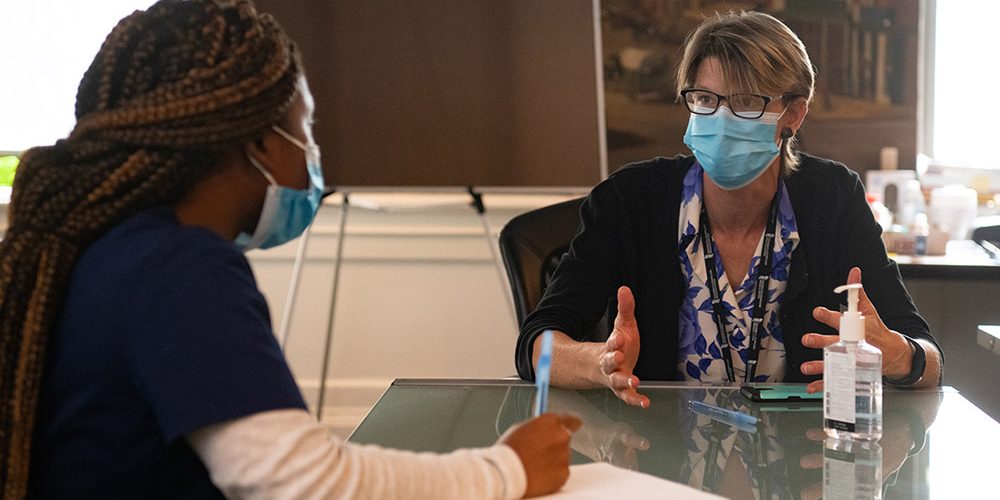Marik Moen, PhD ’18, MPH, RN, assistant professor at the University of Maryland School of Nursing (UMSON), was planning to study how social stability, a public health framework for understanding social disadvantage, is related to risk behaviors associated with contracting HIV.
But when the COVID-19 pandemic unfolded in March 2020, Moen put that research on hold to serve as the director of nursing at the Lord Baltimore Triage, Respite, and Isolation (TRI) Center, which treats people infected with COVID-19 who have no safe place to isolate. (Read more about the TRI Center.)
In caring for these patients, Moen has seen firsthand how the social determinants of health — race and ethnicity, living in unstable or congregate housing, and experiencing poverty — are intertwined with COVID-19 as well.
“We have known for centuries that living conditions are related to risks of infection, whether cholera, HIV, or now COVID-19,” says Moen, who won a two-year, $12,000 UMSON Dean’s Research Scholar Award to help conduct the HIV research. “These are syndemic causes: The presence of one makes the occurrence of the other much more likely.”
Moen reported in 2018 that the six social stability indicators — employment, housing status, income, legal concerns, length at the same residence, and social relationships — consistently predicted exposure to sexual risk behaviors, substance use, and interpersonal violence associated with HIV transmission.
She has now begun to explore how social stability factors are documented in health care settings and to describe their prevalence among people with COVID-19 in Maryland and among persons with HIV in jurisdictions across the United States.
“We still do not systematically assess and document health-related social needs,” Moen says. “In some studies, up to 50 percent of persons reported at least one basic need, but these would have been missed without systematic screening in the health care setting.”
This type of screening matters, says Moen, and not only for collecting more epidemiological data. “We are not just missing information, we are also missing opportunities to intervene,” she says.
According to the American Medical Association, social needs are up to six times more relevant than clinical care in determining health outcomes. In Moen’s review of social stability and HIV risks, incrementally increasing the conditions of stability seemed to significantly alter a person’s likelihood of risk exposure.
“Of course we know that lower social stability puts you at risk, but just one intervention — like one successful referral for housing or a connection to income benefits —could really make a difference,” she says.
As health care systems implement mechanisms to collect information related to basic needs — such as diagnostic “Z” codes that can be captured in a health record to denote indicators of need — nurses or other health care professionals will be engaged in assessing, documenting, and addressing these conditions, Moen says.
She notes that within the University of Maryland Medical System — under the guidance of Chuck Callahan, DO, vice president of population health, and Catherine Miller, MSW, LCSW-C, director of care management — efforts have begun to capture these basic needs with Z codes. In fact, while the number of patient encounters has dramatically decreased during the pandemic, the prevalence of patients reporting Z codes has increased, particularly among those with COVID-19.
COVID-19 has shined a spotlight on the need for improved interventions to assess and address basic needs, in particular conditions of inadequate housing and poverty related to the economic consequences of the pandemic.
“We see over and over again that these conditions walk together,” Moen says. “If our current capacity is addressing only one medical issue at a time, what might we be missing that could be put to use for the prevention of a future epidemic?”




